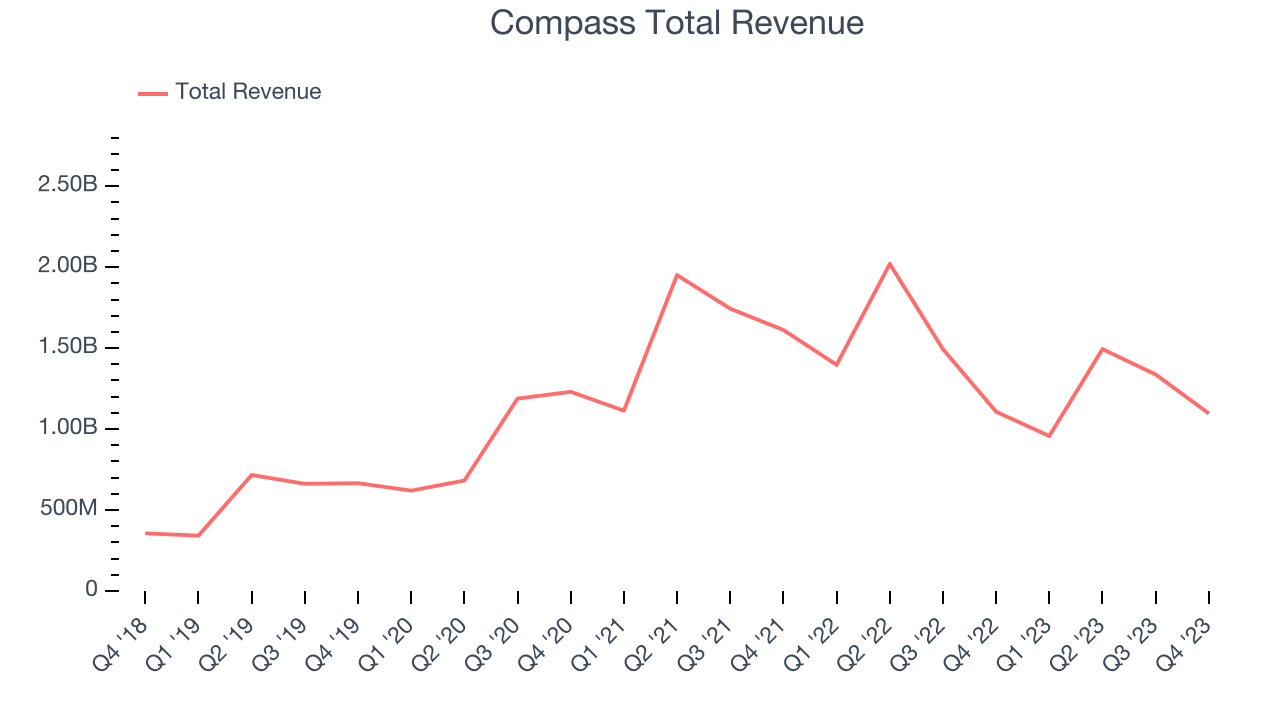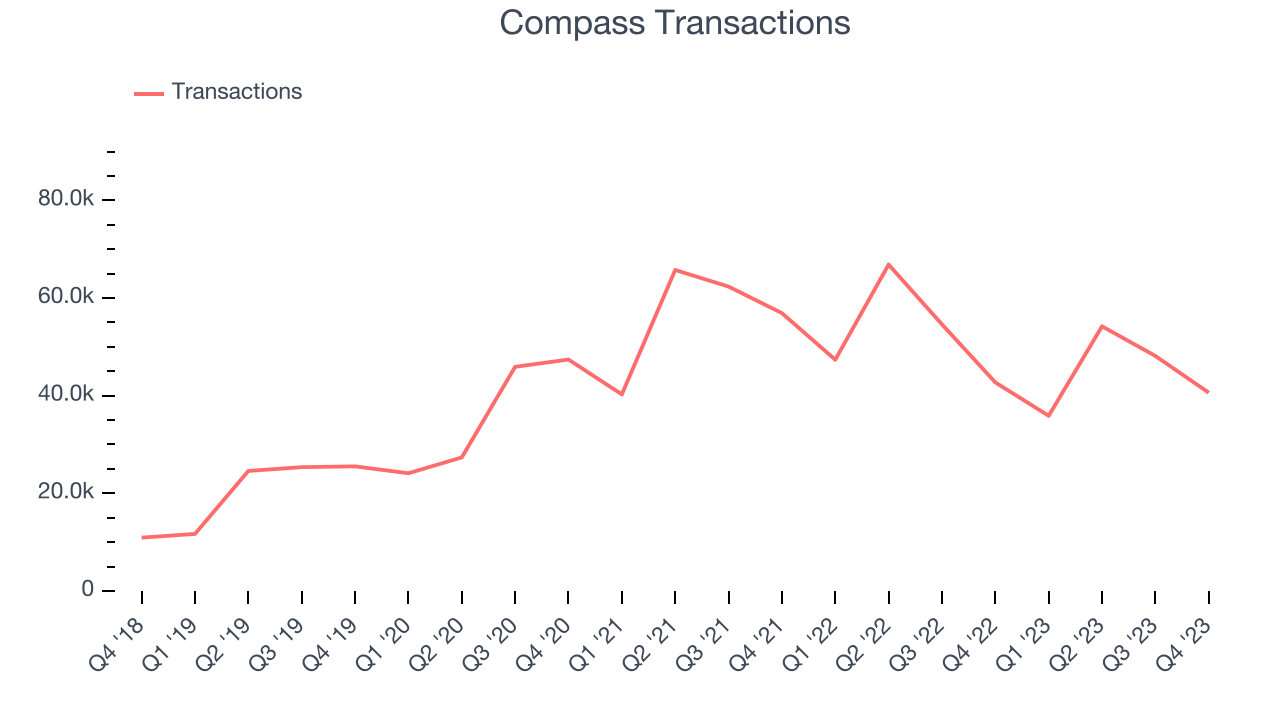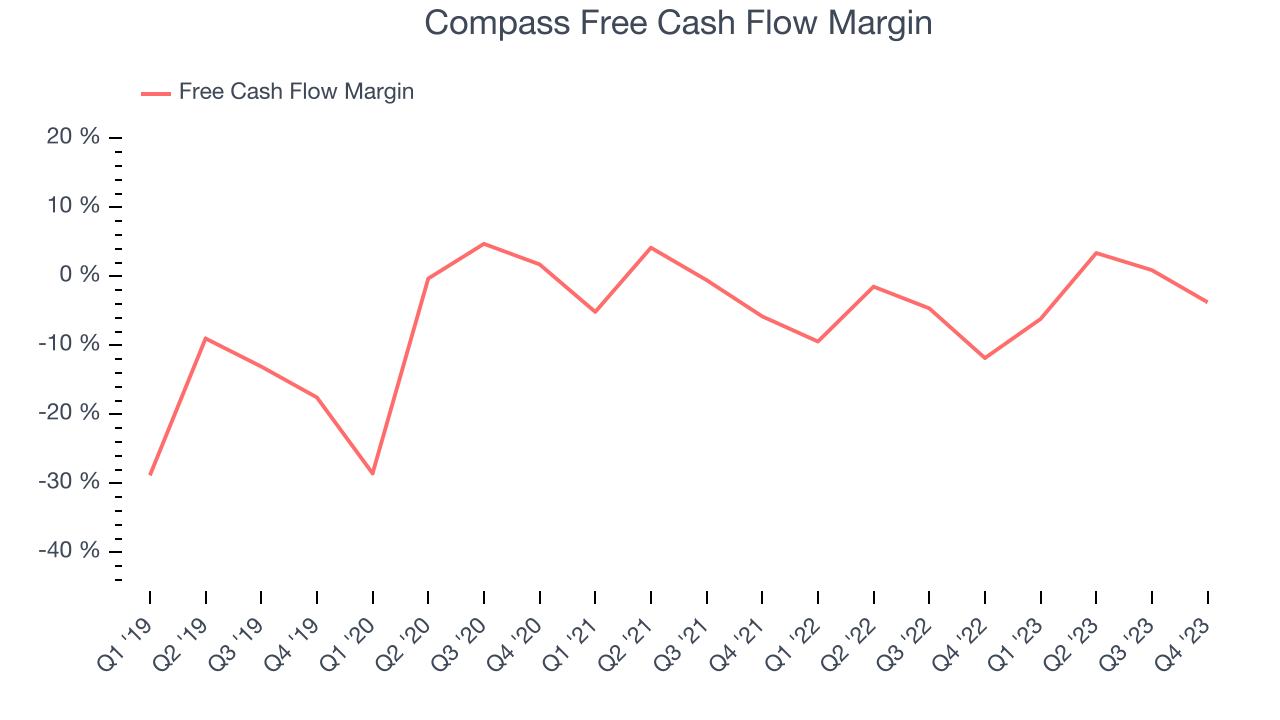Real estate technology company Compass (NYSE:COMP) fell short of analysts' expectations in Q4 FY2023, with revenue flat year on year at $1.10 billion. On the other hand, next quarter's outlook exceeded expectations with revenue guided to $1.03 billion at the midpoint, or 2% above analysts' estimates. It made a GAAP loss of $0.17 per share, improving from its loss of $0.36 per share in the same quarter last year.
Is now the time to buy Compass? Find out by accessing our full research report, it's free.
Compass (COMP) Q4 FY2023 Highlights:
- Revenue: $1.10 billion vs analyst estimates of $1.13 billion (3% miss)
- EPS: -$0.17 vs analyst estimates of -$0.19 (9.4% beat)
- Revenue Guidance for Q1 2024 is $1.03 billion at the midpoint, above analyst estimates of $1.00 billion
- Free Cash Flow was -$41 million, down from $12.2 million in the previous quarter
- Gross Margin (GAAP): 18.3%, up from 9.3% in the same quarter last year
- Transactions: 40,621
- Market Capitalization: $1.59 billion
"Over the past two years, we have successfully navigated the worst residential real estate market in decades and significantly reset our operating expense levels, positioning Compass for what we believe will be significant upside when the market begins to recover," said Robert Reffkin, Founder and Chief Executive Officer of Compass.
Fueled by its mission to replace the "paper-driven, antiquated workflow" of buying a house, Compass (NYSE:COMP) is a digital-first company operating a residential real estate brokerage in the United States.
Real Estate Services
Technology has been a double-edged sword in real estate services. On the one hand, internet listings are effective at disseminating information far and wide, casting a wide net for buyers and sellers to increase the chances of transactions. On the other hand, digitization in the real estate market could potentially disintermediate key players like agents who use information asymmetries to their advantage.
Sales Growth
Examining a company's long-term performance can provide clues about its business quality. Any business can put up a good quarter or two, but the best consistently grow over the long haul. Compass's annualized revenue growth rate of 40.7% over the last five years was incredible for a consumer discretionary business.

Within consumer discretionary, product cycles are short and revenue can be hit-driven due to rapidly changing trends. That's why we also follow short-term performance. Compass's recent history shows a reversal from its five-year trend, as its revenue has shown annualized declines of 12.8% over the last two years.
We can better understand the company's revenue dynamics by analyzing its number of transactions, which reached 40,621 in the latest quarter. Over the last two years, Compass's transactions averaged 9.7% year-on-year declines. Because this decline is slower than its revenue decline during the same period, we can see the company's monetization has fallen.

This quarter, Compass missed Wall Street's estimates and reported a rather uninspiring 1% year-on-year revenue decline, generating $1.10 billion of revenue. The company is guiding for revenue to rise 7.1% year on year to $1.03 billion next quarter, improving from the 31.5% year-on-year decrease it recorded in the same quarter last year. Looking ahead, Wall Street expects sales to grow 8.5% over the next 12 months, an acceleration from this quarter.
Unless you’ve been living under a rock, it should be obvious by now that generative AI is going to have a huge impact on how large corporations do business. While Nvidia and AMD are trading close to all-time highs, we prefer a lesser-known (but still profitable) semiconductor stock benefitting from the rise of AI. Click here to access our free report on our favorite semiconductor growth story.
Cash Is King
If you've followed StockStory for a while, you know we emphasize free cash flow. Why, you ask? We believe that in the end, cash is king, and you can't use accounting profits to pay the bills.
Over the last two years, Compass's demanding reinvestments to stay relevant with consumers have drained company resources. Its free cash flow margin has been among the worst in the consumer discretionary sector, averaging negative 3.7%.

Compass burned through $41 million of cash in Q4, equivalent to a negative 3.7% margin, increasing its cash burn by 68.7% year on year.
Key Takeaways from Compass's Q4 Results
It was good to see Compass beat analysts' operating margin expectations this quarter. We were also glad next quarter's revenue guidance came in higher than Wall Street's estimates. On the other hand, its transactions unfortunately missed and its revenue in Q4 fell short of Wall Street's estimates. Zooming out, we think this was still a decent, albeit mixed, quarter. The stock is up 3.6% after reporting and currently trades at $3.55 per share.
So should you invest in Compass right now? When making that decision, it's important to consider its valuation, business qualities, as well as what has happened in the latest quarter. We cover that in our actionable full research report which you can read here, it's free.
